The Counterfeit Money Detection Market is estimated to be valued at USD 4.3 billion in 2025 and is projected to reach USD 7.0 billion by 2035, registering a compound annual growth rate (CAGR) of 5.0% over the forecast period. The absolute dollar opportunity for the entire period stands at USD 2.7 billion. From 2025 to 2030, the market is expected to expand steadily, driven by increasing circulation of counterfeit currency, growth in cross-border trade, and stricter banking regulations.
This initial phase will contribute around USD 1.1 billion in opportunity, supported by the rising adoption of multi-currency detection devices in retail, transportation, and financial institutions. Between 2030 and 2035, the market will add another USD 1.6 billion in opportunity, underpinned by enhanced integration of AI-enabled counterfeit detection systems and growing demand from emerging economies.
Governments and corporate entities are prioritizing security measures, creating demand for portable, network-connected detection devices. Cash-heavy industries such as hospitality and public transport are projected to invest heavily in updated solutions with faster verification speeds and reduced false-positive rates.
The overall phase-wise expansion shows balanced yet consistent acceleration, indicating the market’s ability to adapt to both regulatory pressures and technological upgrades. This sustained trajectory emphasizes a solid long-term growth outlook for industry participants.
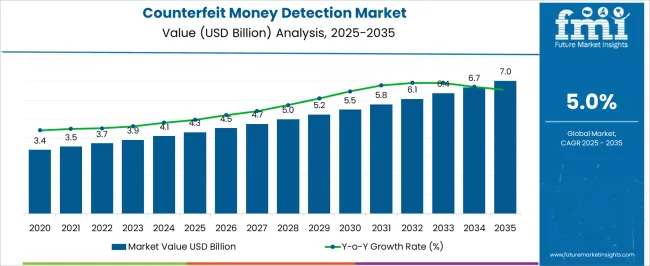
| Metric | Value |
|---|---|
| Counterfeit Money Detection Market Estimated Value in (2025 E) | USD 4.3 billion |
| Counterfeit Money Detection Market Forecast Value in (2035 F) | USD 7.0 billion |
| Forecast CAGR (2025 to 2035) | 5.0% |
The counterfeit money detection market is experiencing steady growth due to increasing financial fraud, expanding retail infrastructure, and rising regulatory vigilance around currency authenticity. Businesses across sectors are prioritizing cash-handling integrity to minimize revenue losses caused by counterfeit notes.
Technological evolution in currency scanning systems, with embedded automation and real-time detection features, has enabled faster, more reliable currency validation across both low- and high-volume cash transaction environments. Central banks and law enforcement agencies are actively educating businesses on anti-counterfeit practices, further driving device adoption.
Demand is also being supported by upgrades in security features across global currencies, requiring compatible detection equipment. Looking ahead, integration with AI-based pattern recognition and multi-currency compatibility is expected to create long-term opportunities, especially across emerging economies and cash-reliant ecosystems.
The counterfeit money detection market is segmented by product type, technology, application, end-use industry, and geographic regions. The counterfeit money detection market is divided by product type into Currency detector, Coin & currency counters, Currency sorter, Pens, and Others. The technology of the counterfeit money detection market is classified into Ultraviolet, Infrared, Magnetic, Watermark, Microprint, and Others.
The counterfeit money detection market is segmented into Kiosks, Self-checkout machines, Gaming machines, Vehicle parking machines, Automatic fare collection machines, Vending machines, and Others. The end-use industry of the counterfeit money detection market is segmented into Retail & e-commerce, BFSI, Gaming, Transportation, Hospitality and tourism, and Others.
Regionally, the counterfeit money detection industry is classified into North America, Latin America, Western Europe, Eastern Europe, Balkan & Baltic Countries, Russia & Belarus, Central Asia, East Asia, South Asia & Pacific, and the Middle East & Africa.
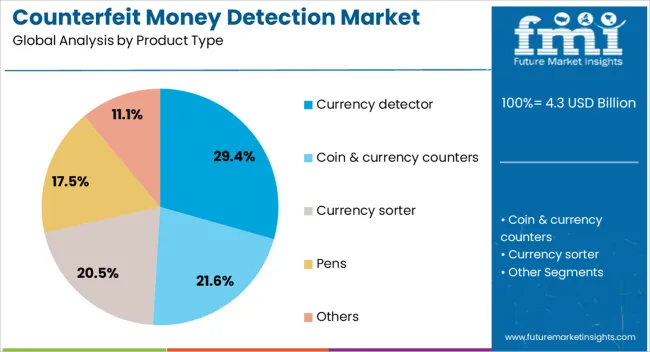
Currency detectors are expected to account for 29.4% of the total revenue in the counterfeit money detection market by 2025, marking them as the leading product segment. Their widespread use across retail outlets, hospitality, financial institutions, and transportation hubs is being driven by affordability, ease of use, and reliable detection capabilities.
These detectors offer compatibility with multiple currencies and support a range of security checks, including watermark, magnetic ink, and infrared sensing. Continuous updates to currency designs have led businesses to opt for modular detector systems that can adapt to changing note standards.
Their portability and low maintenance requirements make them ideal for small and medium enterprises where space and cost efficiency are critical. These factors have cemented the dominance of currency detectors as the first line of defense in counterfeit prevention.
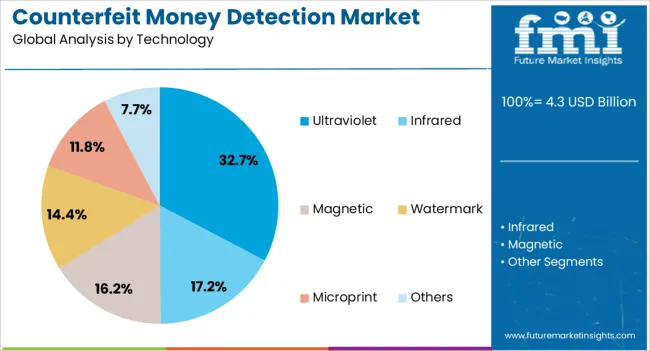
Ultraviolet (UV) technology is anticipated to contribute 32.7% of market revenue by 2025, making it the most utilized technology in counterfeit detection. Its effectiveness in authenticating currency through fluorescent ink detection and embedded thread visibility has ensured its continued application across both entry-level and professional-grade devices.
UV scanning is cost-effective and offers quick validation, which is vital in high-speed cash environments. Advancements in LED UV sources have improved energy efficiency and detection precision, reducing long-term operational costs.
With many currencies worldwide incorporating UV-reactive features, the demand for UV-based devices remains strong. Their integration with hybrid technologies, including magnetic and infrared verification, has further strengthened their role in high-trust cash validation workflows.
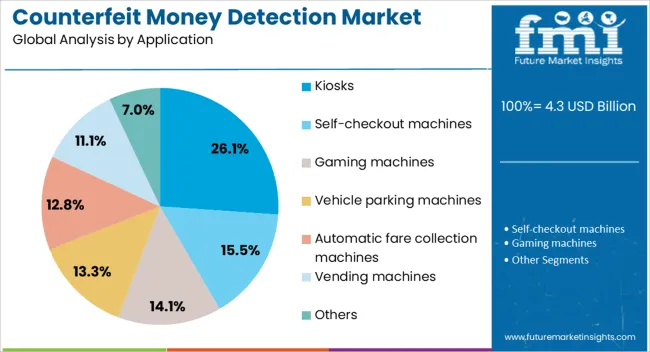
Kiosks are projected to capture 26.1% of the total market share in 2025, positioning them as the leading application area in the counterfeit money detection space. Their rise is supported by growing deployment across self-service environments such as ATMs, ticketing machines, retail checkout counters, and bill payment stations.
The ability to validate currency in unattended settings has become increasingly important as businesses prioritize operational efficiency and customer convenience. Integration of counterfeit detection systems into kiosks reduces the need for human supervision and enhances transactional trust in public spaces.
Moreover, the rise in smart kiosk installations with multifunctional capabilities is accelerating the inclusion of high-grade currency validation modules. As demand for contactless, self-service models grows across sectors, kiosks are expected to remain a dominant application area.
The counterfeit money detection market is expanding due to increasing concerns over financial fraud and rising counterfeit incidents globally. Growth in 2024 and 2025 was driven by enhanced demand from banking, retail, and government sectors. Opportunities are arising in the integration of multi-functional detection systems for diverse applications. Emerging trends include the use of AI and machine learning for improved fraud detection accuracy. However, high installation costs and complexity in adapting detection systems to new counterfeit techniques limit market penetration.
The major growth driver in the counterfeit money detection market is the increasing incidents of financial fraud and counterfeit currency. In 2024 and 2025, the rising sophistication of counterfeit techniques has prompted governments, banks, and retail establishments to invest in more advanced detection systems. As counterfeiters employ new technologies, the demand for highly accurate and reliable detection solutions has surged, pushing the market’s growth, particularly in high-volume transactions and regions with limited financial infrastructure.
Significant opportunities are arising with the development of multi-functional counterfeit detection systems and the integration of artificial intelligence. In 2025, solutions combining UV, infrared, and magnetic detection technologies gained popularity for their ability to identify a wider range of counterfeit bills. Additionally, AI and machine learning have been integrated into these systems to enhance fraud detection accuracy, improve operational efficiency, and provide real-time analytics. This innovation is expected to drive future demand across multiple sectors, from banking to retail.
Emerging trends in the market include the growing use of artificial intelligence and automation in counterfeit detection. In 2024, AI-powered systems enabled faster and more accurate identification of fake currency by analyzing various features and patterns. The integration of automation in retail environments further streamlined cash-handling processes, reducing human error and improving overall security. These advancements reflect the increasing reliance on smart, efficient solutions for safeguarding financial transactions and reducing losses from counterfeit activities.
Key market restraints include high initial costs and the complexity of adapting detection systems to evolving counterfeit techniques. In 2024 and 2025, the high cost of advanced counterfeit money detectors, particularly those incorporating AI, limited their adoption, especially in smaller businesses and developing regions. Additionally, continuously evolving counterfeiting methods require constant updates to detection systems, posing challenges for system adaptability and adding to operational costs. These factors hinder widespread market penetration, particularly in cost-sensitive sectors.
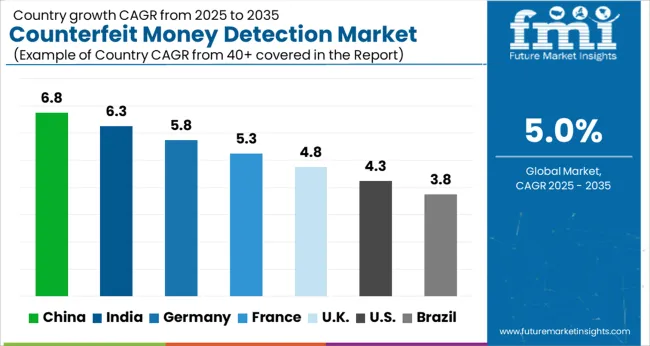
The global counterfeit money detection market is projected to grow at 5% CAGR from 2025 to 2035. China leads with 6.8% CAGR, driven by the growing adoption of advanced technologies in banking, retail, and security sectors. India follows at 6.3%, supported by the increasing use of counterfeit detection devices in cash-heavy industries such as retail, hospitality, and banking.
Germany records 5.8% CAGR, with strong demand for high-precision counterfeit detection solutions in the financial sector. The United Kingdom grows at 4.8%, while the United States posts 4.3%, reflecting steady demand in mature markets with a focus on improving security systems and the transition to cashless transactions. Asia-Pacific leads market growth due to industrial demand, while Europe and North America focus on technology integration and financial security.
The counterfeit money detection market in China is forecasted to grow at 6.8% CAGR, driven by the rapid expansion of the banking and retail sectors, where counterfeit money detection devices are becoming essential for security and fraud prevention. As China strengthens its financial and retail infrastructure, there is a growing need for more advanced counterfeit detection technologies. Government initiatives to enhance financial security and reduce the circulation of counterfeit currency further boost the market.
The counterfeit money detection market in India is projected to grow at 6.3% CAGR, driven by the country’s increasing adoption of advanced detection devices across sectors like banking, retail, and hospitality. With the growing emphasis on financial security and the need for efficient cash management systems, businesses and financial institutions are increasingly investing in counterfeit detection technologies. Additionally, India’s rising cash circulation and the shift toward more secure payment systems further boost the market.
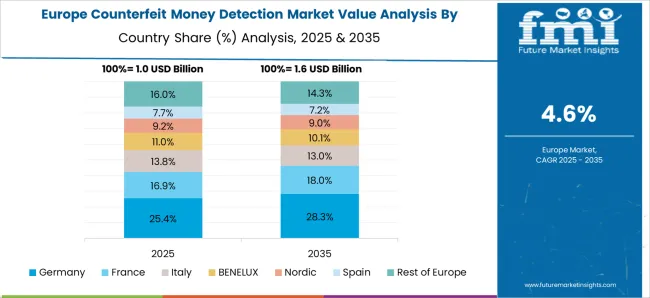
The counterfeit money detection market in Germany is expected to grow at 5.8% CAGR, driven by the increasing adoption of counterfeit detection devices in financial institutions, retail businesses, and government sectors. As Germany continues to modernize its banking and retail sectors, the demand for high-precision counterfeit detection technologies rises. Furthermore, regulatory requirements for secure financial transactions and anti-fraud measures strengthen market growth.
The counterfeit money detection market in the United States is projected to grow at 4.3% CAGR, reflecting steady demand for counterfeit detection technologies in various sectors, particularly in banking, retail, and government services. As the USA focuses on improving financial security and reducing counterfeit risks, the need for advanced counterfeit detection solutions in automated teller machines (ATMs), point-of-sale systems, and other payment channels increases. Additionally, the shift toward more secure payment methods boosts market growth.
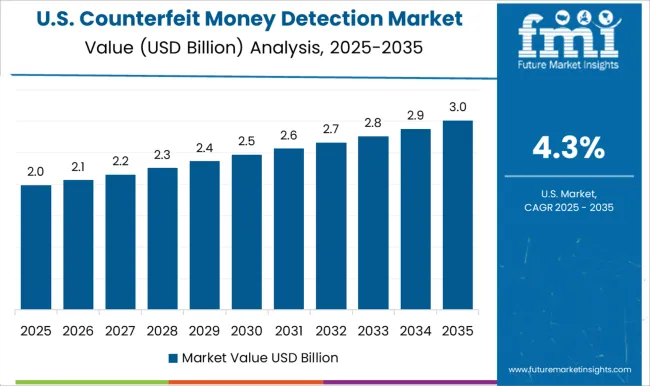
The retail displays market in the United States is projected to grow at 5.1% CAGR, reflecting steady demand in a mature retail industry. With the increasing focus on enhancing in-store customer experiences, demand for interactive displays, digital signage, and LED systems rises. The trend toward data-driven retail solutions, where displays are used for real-time promotions and targeted advertising, strengthens market growth. Additionally, as more retailers integrate e-commerce with physical stores, the demand for omnichannel retail solutions continues to rise.
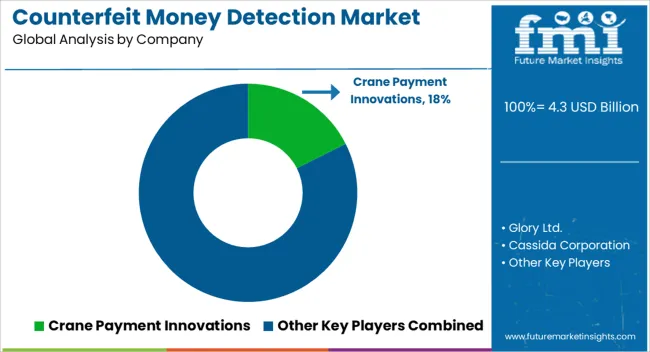
The counterfeit money detection market is dominated by Crane Payment Innovations, which leads with advanced currency validation technologies that are widely used across banking, retail, and vending sectors. Crane’s dominance is supported by its robust portfolio of counterfeit detection systems, offering high accuracy and reliability in identifying fraudulent notes.
Key players such as Glory Ltd., Cassida Corporation, Japan Cash Machine Co., Ltd., and Innovative Technology Ltd. maintain significant market shares by providing cutting-edge solutions, including bill validators, coin counters, and currency sorting systems, designed to prevent counterfeit circulation. These companies focus on improving detection speed, enhancing security features, and integrating systems with existing point-of-sale and ATM networks.
Emerging players like Accubanker, DRI Mark Products Inc., and others are expanding their presence by offering compact, cost-effective detection devices suitable for small businesses, kiosks, and low-volume environments. Their strategies involve improving ease of use, expanding into emerging markets, and offering customizable solutions that meet regulatory requirements.
Market growth is driven by increasing demand for secure payment systems, rising concerns over counterfeit currency circulation, and the expansion of digital payment solutions. Continuous innovations in sensor technologies, AI-driven analysis, and multi-currency validation systems are expected to further influence competitive dynamics in the global counterfeit money detection market.
| Item | Value |
|---|---|
| Quantitative Units | USD 4.3 Billion |
| Product Type | Currency detector, Coin & currency counters, Currency sorter, Pens, and Others |
| Technology | Ultraviolet, Infrared, Magnetic, Watermark, Microprint, and Others |
| Application | Kiosks, Self-checkout machines, Gaming machines, Vehicle parking machines, Automatic fare collection machines, Vending machines, and Others |
| End-Use Industry | Retail & e-commerce, BFSI, Gaming, Transportation, Hospitality and tourism, and Others |
| Regions Covered | North America, Europe, Asia-Pacific, Latin America, Middle East & Africa |
| Country Covered | United States, Canada, Germany, France, United Kingdom, China, Japan, India, Brazil, South Africa |
| Key Companies Profiled | Crane Payment Innovations, Glory Ltd., Cassida Corporation, Japan Cash Machine Co., Ltd., Accubanker, DRI Mark Products Inc., and Innovative Technology Ltd. |
| Additional Attributes | Dollar sales by detection technology and application, demand dynamics across banking, retail, and law enforcement sectors, regional trends in counterfeit money detection adoption, innovation in AI-based detection systems and security features, impact of regulatory standards on currency protection, and emerging use cases in digital and cryptocurrency security. |
The global counterfeit money detection market is estimated to be valued at USD 4.3 billion in 2025.
The market size for the counterfeit money detection market is projected to reach USD 7.0 billion by 2035.
The counterfeit money detection market is expected to grow at a 5.0% CAGR between 2025 and 2035.
The key product types in counterfeit money detection market are currency detector, coin & currency counters, currency sorter, pens and others.
In terms of technology, ultraviolet segment to command 32.7% share in the counterfeit money detection market in 2025.






Our Research Products

The "Full Research Suite" delivers actionable market intel, deep dives on markets or technologies, so clients act faster, cut risk, and unlock growth.

The Leaderboard benchmarks and ranks top vendors, classifying them as Established Leaders, Leading Challengers, or Disruptors & Challengers.

Locates where complements amplify value and substitutes erode it, forecasting net impact by horizon

We deliver granular, decision-grade intel: market sizing, 5-year forecasts, pricing, adoption, usage, revenue, and operational KPIs—plus competitor tracking, regulation, and value chains—across 60 countries broadly.

Spot the shifts before they hit your P&L. We track inflection points, adoption curves, pricing moves, and ecosystem plays to show where demand is heading, why it is changing, and what to do next across high-growth markets and disruptive tech

Real-time reads of user behavior. We track shifting priorities, perceptions of today’s and next-gen services, and provider experience, then pace how fast tech moves from trial to adoption, blending buyer, consumer, and channel inputs with social signals (#WhySwitch, #UX).

Partner with our analyst team to build a custom report designed around your business priorities. From analysing market trends to assessing competitors or crafting bespoke datasets, we tailor insights to your needs.
Supplier Intelligence
Discovery & Profiling
Capacity & Footprint
Performance & Risk
Compliance & Governance
Commercial Readiness
Who Supplies Whom
Scorecards & Shortlists
Playbooks & Docs
Category Intelligence
Definition & Scope
Demand & Use Cases
Cost Drivers
Market Structure
Supply Chain Map
Trade & Policy
Operating Norms
Deliverables
Buyer Intelligence
Account Basics
Spend & Scope
Procurement Model
Vendor Requirements
Terms & Policies
Entry Strategy
Pain Points & Triggers
Outputs
Pricing Analysis
Benchmarks
Trends
Should-Cost
Indexation
Landed Cost
Commercial Terms
Deliverables
Brand Analysis
Positioning & Value Prop
Share & Presence
Customer Evidence
Go-to-Market
Digital & Reputation
Compliance & Trust
KPIs & Gaps
Outputs
Full Research Suite comprises of:
Market outlook & trends analysis
Interviews & case studies
Strategic recommendations
Vendor profiles & capabilities analysis
5-year forecasts
8 regions and 60+ country-level data splits
Market segment data splits
12 months of continuous data updates
DELIVERED AS:
PDF EXCEL ONLINE
Counterfeit Drug Detection Device Market Size and Share Forecast Outlook 2025 to 2035
Ice Detection System Market Trends, Growth & Forecast 2025 to 2035
Gas Detection Equipment Market Growth – Trends & Forecast 2024-2034
Leak Detection Equipment Market Size and Share Forecast Outlook 2025 to 2035
Odor Detection Equipment Market Size and Share Forecast Outlook 2025 to 2035
Bird Detection System Market Size and Share Forecast Outlook 2025 to 2035
Anti-counterfeit Pharmaceutical Packaging Market Size and Share Forecast Outlook 2025 to 2035
Leak Detection Market Size and Share Forecast Outlook 2025 to 2035
Anti-Counterfeit NFC Packaging Market Size and Share Forecast Outlook 2025 to 2035
Anti-money Laundering Market Size and Share Forecast Outlook 2025 to 2035
Leak Detection Dye Market Trends & Demand 2025 to 2035
Anti-Counterfeit Packaging for Food & Beverages Market Growth - Forecast 2025 to 2035
Anti-Counterfeit Packaging Market Trends - Growth & Forecast 2025 to 2035
Anti-counterfeit Cosmetic Packaging Market Growth - Demand & Forecast 2025 to 2035
Fall Detection System Market Insights – Size & Forecast 2025 to 2035
Market Share Distribution Among Anti-Counterfeit Pharmaceutical Packaging Providers
Anti-Money Laundering (AML) Software Solution Market
Spark Detection System Market Forecast and Outlook 2025 to 2035
Fault Detection and Classification Market Size and Share Forecast Outlook 2025 to 2035
Spoil Detection Based Smart Label Market Size and Share Forecast Outlook 2025 to 2035

Thank you!
You will receive an email from our Business Development Manager. Please be sure to check your SPAM/JUNK folder too.
Chat With
MaRIA